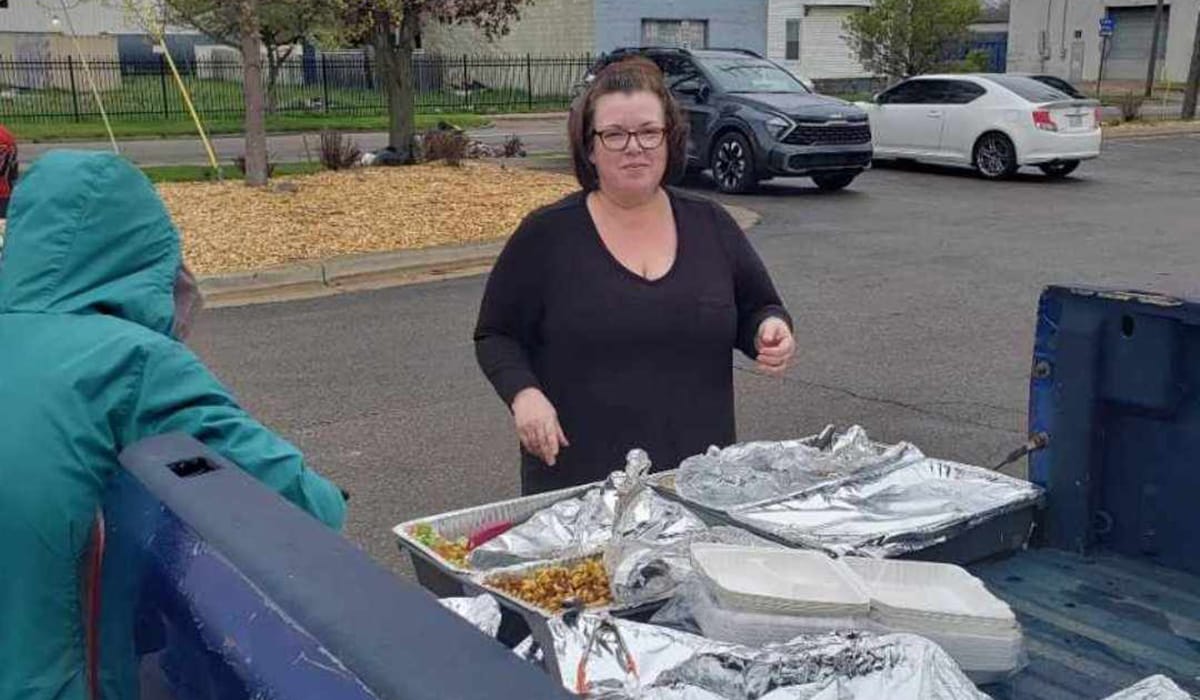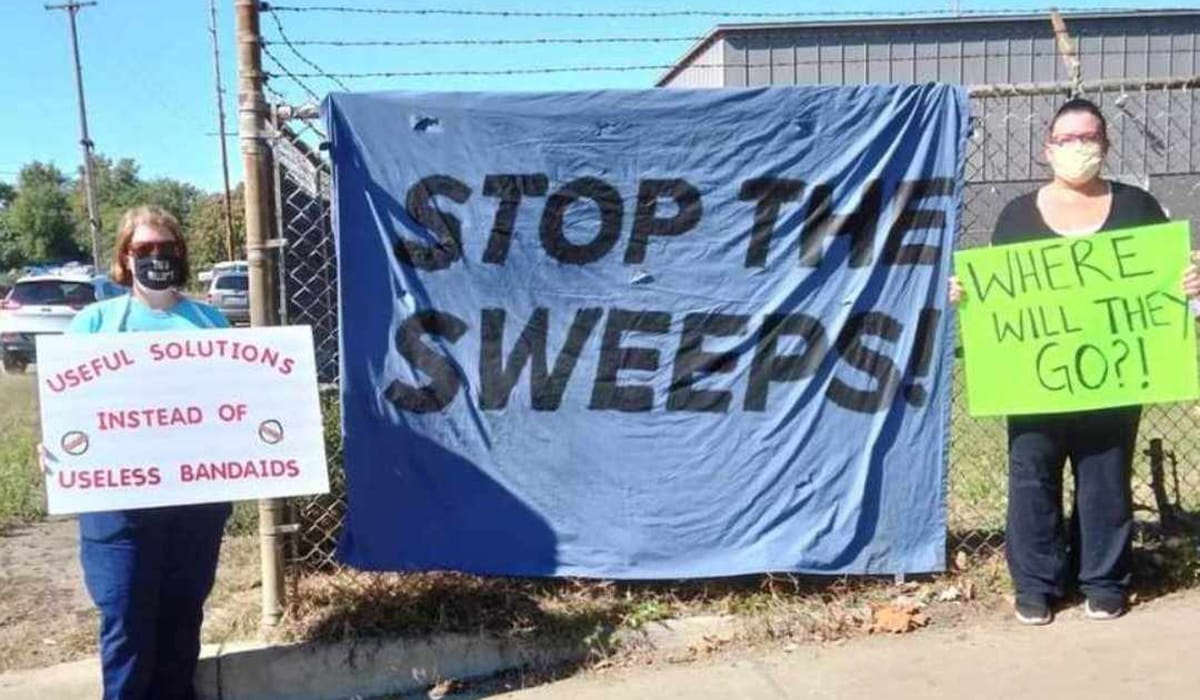Volunteer Provides Meals, Hygiene Products and More to People Experiencing Homelessness

Meet Daily Point of Light Award honoree Megan Giambrone. Read her story, and nominate an outstanding volunteer or family as a Daily Point of Light.
After volunteering mostly in animal rescue, Megan Giambrone unexpectedly found herself helping the pets of people experiencing homelessness in Kalamazoo, Michigan. She discovered a new passion for this community, and developed a plan with other zealous volunteers to create a new organization dedicated to filling the immediate need to help the unhoused of Kalamazoo County.
She co-founded United for the Unsheltered of Kalamazoo in February of 2022 and now serves as the CEO and president of the Board of Directors. Giambrone wears many hats and fulfills a multitude of roles at United for the Unsheltered of Kalamazoo, and even though every day is different, one thing remains for Giambrone: she will never stop advocating for this community.
What inspires you to volunteer?
I started probably 20 years ago doing animal rescue. Over the years it specialized into what we call the “derpy cats”. Those are cats that either have behavioral, social or medical issues that make them less likely to be adopted. We would take them in and we did foster hospice for elderly aging and medically fragile pets until they were ready to pass. They stayed with us and they were part of our family.
We did that for many years, my husband and I, and then about three years ago I got a call from a friend that was also very active in animal rescue. She told me there had been a Parvo outbreak at one of the homeless encampments and asked me if I wanted to come down and help test and vaccinate dogs. I said sure.
That was the first time I had ever seen homelessness to that degree in my city. I had always seen it, you know, downtown, I’d see folks outside the Gospel Mission. But I knew there were two encampments in town just based on what we were trying to plan out for this Parvo outbreak. There were probably 100 people that had set up almost a village of tents and tarps. We were there to help take care of the animals, but I got to several of the people and just kind of talked. I started getting more and more active, I started initially cooking for them. I’m Italian, I like to cook big meals. So I started cooking and talking to the people at the encampment with some friends and started becoming very active protesting the way my city was treating the unhoused folks, until finally the encampments were being torn down.
We got a call from a person who was active with the unhoused community who called everybody she knew and said that we need as much help as possible getting folks out and getting their belongings out. There was heavy equipment and bulldozers. People were scrambling, pets were running everywhere. We all showed up at the encampment that we were the closest to and we spent the next probably 14 hours until very, very late into the night trying to help people get their belongings together and act as intermediaries between them and the police.
We all started working as a group. But we just had a different vision for how we wanted a group to be and so we were all sitting around one day and we said you know what, we could do this. We all thought about what it would entail and how starting an organization would work. We went ahead and after several months of feeding unhoused folks out of our own pocket and taking care of them we incorporated and got recognized by the IRS and are now a legitimate 501c(3) nonprofit. Now we still do what we did before, but it made us eligible for grant money, and a lot more support from organizations in the community.
Tell us about your volunteer role with United for the Unsheltered of Kalamazoo.
Something that makes us very different, and we’re very proud of, is that we still go to the camps. Even though there are no longer the two large encampments, there are dozens of tiny ones that are routinely moved. We go to those camps and we take cooked meals and we provide hygiene products. We also are very proud of the fact that we always, always have BIPOC — black, indigenous, and other people of color — friendly skin care because Black and Brown skin requires different care than white skin. We’ve branched out to provide a lot of gear. In the winter, we’ve done dozens of tents, hundreds and hundreds of sleeping bags, socks, coats and shoes.
I’m usually available seven days a week. I’m the primary point of contact for any other organization. I work really hard to try to build partnerships within the community and we’ve been extremely blessed that we have some amazing partnerships. I also go out to the camps, I fill out paperwork with our folks if they’re trying to get housing vouchers, I cook, I drop off food and more. If I get a call that someone needs dog food, I try and either find it through our organization or another organization will agree to purchase some. I’m kind of just a jack of all trades.
I also just want to make it clear that there’s no way I could do what I do without our volunteers. There are so many moving pieces that are so crucial. Volunteers willing to step in, when somebody is sick or out of town, I’ll call one of my volunteers and go. It really does take a village and I’m so lucky that I’m surrounded with just amazing volunteers.
What’s been the most rewarding part of your work?
These folks. We call them unhoused because when a lot of them worked, COVID-19 happened. That was disastrous for these folks and divorces happened. We’re all literally a couple of paychecks away from what these people are experiencing. But the fact that they trust us enough to call and go, they’re basically letting us know their spot that they’re trying to keep secret so that they don’t get evacuated. They trust us to tell us what their needs are. And building that trust with them is amazing.
I’m also so blessed because our board of directors is amazing. Our volunteers are amazing. Everybody feels safe talking to any one of our volunteers about anything. We hear a lot of life stories. We hear a lot of the details. They aren’t really willing to share with a lot of folks, so that’s huge. It’s all about the trust that they put in us and we are very careful to never mistreat that.
What have you learned through your experiences as a volunteer?
I won’t lie, growing up my parents had a very narrow-minded view on people who were unhoused. Because in the small town that I was from, there really wasn’t a crisis of homelessness or people being unhoused. It was incredibly small. I grew up just assuming that what a lot of society still assumes, unfortunately, that they must be lazy, they must be criminals or they must have done something wrong. As I got older, I started to understand that it wasn’t true. I think in the last two to three years of doing this, it’s become terrifyingly real. That it really can happen to anybody. You don’t have to have done anything wrong; you can do everything perfectly and it can happen to anybody. I’ve come to understand that this is a much bigger problem than I think a lot of the community even realizes.

Any advice for people who want to start volunteering?
Just do it. Not a lot of volunteers can go, or feel comfortable going, to the encampments. But there are a lot of people behind the scenes who get the supplies ready. We have one woman, she can’t stand very long, but she loves to bake. So she bakes every week at least once and somebody picks up the most amazing cookies. Our folks have come to expect them and are very excited about them. I have another volunteer who loves the paperwork; spreadsheets are her love language. They’re not mine. There’s always going to be a place and an organization for any talent.
What do you want people to learn from your story?
We need to stop looking at homelessness or houselessness like it’s a disease. There needs to be more compassion. None of us ever really knows what’s going on behind the scenes in anyone’s life. Yes, there is a very small portion of the population that prefers this kind of lifestyle; they feel it gives them a certain kind of freedom. But most folks want help if they can get it. But to fill out paperwork for housing, you have to have identification. To get identification, you have to have a social security card and a birth certificate. To get a birth certificate or social security card, you have to have identification, right? So it’s a snake eating its tail. When you couple that with the fact that phones are stolen, funding runs out, people have to move hurriedly for either personal reasons or because the police have moved them or their paperwork gets lost in the system and they get dropped — they have to start all over again. Folks don’t have that kind of access. So I wish people understood more that there really is a cycle that does hold a lot of people back from getting the support that they need. I wish people would just give the same compassion they would want to get if the shoe was on the other foot.
Tell us about future partnerships, programs or events that you are excited about.
We partner with a lot of local agencies. One always holds a resource event. A lot of organizations come together. It’s almost kind of like a job fair of sorts, but it’s for resources, food, medical care, shower and haircut opportunities, getting clothing and supplies and more. Really, we don’t necessarily operate on big events, we just tried to just keep the pace of the day-to-day. It’s just a little bit harder to try and do big events just because there’s never necessarily a good time to do it. We just we try to focus on what’s needed each day.
Do you want to make a difference in your community like Megan? Find local volunteer opportunities.